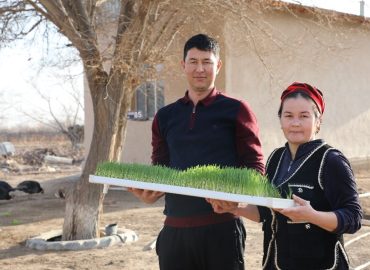Wrightstown NonProfit UrbanPonics
At Wrightstown nonprofit UrbanPonics, farmers go vertical
Wrightstown Nonprofit UrbanPonics | Raeanne Raccagno |
IMAGE: Merrill Pierce, left, and Webb Stone show students from George School’s Applied Technology and Botany class how a deep-water culture aquaponic system works during a field trip to UrbanPonics. LAURA PEDRICK FOR URBANPONICS
The concerns and reality of food deserts, large food waste and poor access to healthy foods are rising but the people behind a local nonprofit say growing your own food vertically, soilless and indoors could be the solution.
With the cold seasons approaching, grocery trips for produce can be disappointing.
One of the biggest reasons for that is food transportation — 40% of produce spoils during transport. Another 31% goes rotten after purchase but before a consumer can use it.
However, hydroponic and aquaponic farming could allow shoppers to pick their own produce in their own homes.
Imagine if “when you make a salad or sandwich, you can just walk over and cut your produce,” said Webb Stone, the founder of UrbanPonics.
Based out of Middletown Grange in Wrightstown, UrbanPonics is a nonprofit devoted to year-round agriculture, educating the community on vertical farming, and promoting environmentally sustainable farming techniques. The organization is led by a group of seven with diverse backgrounds. But they all share a passion for promoting the benefits of hydroponics and aquaponics.
“People remodel their basement and get a wine cellar or entertainment room,” Stone said. “We can just as easily come in, find out your grocery list, figure out what system would allow you to grow it in your room and build a food closet.”
Vertical farming is the technique of growing crops vertically instead of horizontally in the ground. The practice allows for the preservation of space which results in more produce, and optimizes plant growth since it is in a controlled environment through methods of hydroponics, aquaponics and aeroponics.
During the summer, plants only get 14 to 16 hours of sunlight, but indoors they can get light for 16 to 18 hours, and growers can control other factors like heat, humidity and nutrients to the plant.
Hydroponics is soilless farming that uses water-soluble fertilizers instead of pesticides or chemical fertilizers found in soil and uses 95% less water than field farming.
“Aquaponics everything gets balanced out over time,” Stone said, explaining how aquaponics is a type of agriculture that raises fish in tanks. “The bacteria in the water breaks down the fish waste and ammonia to convert them into two types of nitrates that will be taken up by the plants.”
The biggest concern people have about vertical crops, he said, is the taste.
“It’s pretty sad when I have to tell them that it’s better,” Stone said. “It’s good food if not better because it’s fresh and you know the chemical footprint versus what you get from a grocery store that’s been through multiple middlemen and wholesalers and you just have to trust the organic title.”
“We know we need good food, especially fresh produce, and our neighborhoods are starving for good quality jobs and that’s when we hit on the idea of growing locally and using our neighbors,” Webb said, explaining the educational and engaging portion of the nonprofit.
Along with informing the public, UrbanPonics also seeks to build a farming enterprise for schools and communities that will become a part of the local food supply chain and create agricultural career opportunities for the next generation of farmers.
UrbanPonics has started to do so, with its popularity soaring at the Middletown Grange Fair and by creating a partnership with the Bucks County Technical High School. UrbanPonics helped the students create an aquaponics system in their greenhouse with their Farm to School to Farm program and BCTHS has introduced the new study into their curriculum this year.
The organization has two other programs — Community to Class and Education to Entrepreneur — and offers growing systems for commercial and individual units.
“The smaller units of 4,000 square feet can employ four to five people who all make a good profit at the end of the year,” Stone said.
“We can start modeling the idea of being self-sustainable if you grow some of the fresh produce you need at home. I definitely think growing indoors is the way of the future and we’re proud to be a part of it,” Stone said.
Original Article: https://buckscountyherald.com/stories/at-wrightstown-nonprofit-urbanponics-farmers-go-vertical-with-aquaponics-hydroponics,28754
The post Wrightstown NonProfit UrbanPonics appeared first on GROZINE.


